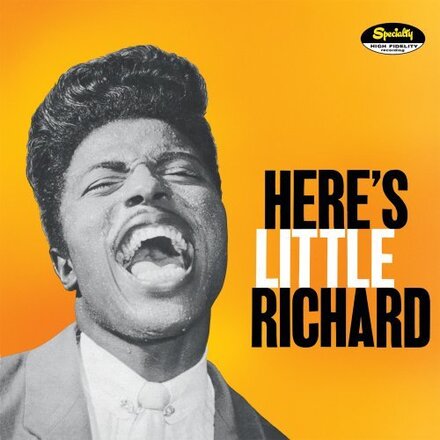Concord Music Group to Release Little Richard Album, “Here’s Little Richard” on April 17th, 2012
LITTLE RICHARD’S SPECIALTY HITS ARE COMBINED WITH ORIGINAL DEMOS AND
TWO VIDEOS ON CONCORD MUSIC GROUP’S ‘HERE’S LITTLE RICHARD REISSUE,’ TO
BE RELEASED APRIL 17, 2012
Fifteen-song disc also features a never-before-heard interview with Specialty Records founder Art Rupe about the discovery of the rock ’n’ roll legend
LOS ANGELES, Calif. — Rock ’n’ roll may date back to Jackie Brenston’s “Rocket 88” in 1951 and perhaps further to blues/swing hybrids of the 1940s. But many would contend that Little Richard’s “Tutti Frutti,” recorded at Cosimo Matassa’s studio in new Orleans in September 1955, was the first great rock ’n’ roll record. “Tutti Frutti” kicks off Here’s Little Richard, Concord Music Group’s expanded reissue of the original Specialty Records album from 1957. Street date is April 17, 2012.
In addition to the original recordings of Little Richard’s best known hits — “Long Tall Sally, ” “Ready Teddy, ” “Jenny Jenny, ” “Rip It Up, ” “Slippin’ and Slidin’” and more — the Concord remastered reissue features two bonus tracks (Specialty demo recordings of “Baby” and “All Night Long”) and two videos (screen tests of “Tutti Frutti” and “Long Tall Sally”). The set contains liner notes by R&B musicologist Lee Hildebrand, as well as the notes from the original LP.
Although Little Richard recorded for RCA Victor in 1951 and Peacock Records in 1953, his Specialty years — the 25-month period between September 1955 and October 1957 — proved monumental. As annotator Hildebrand writes, “They are quite possibly the most exciting and incendiary recordings in the annals of popular music and constitute a body of work upon which Richard’s reputation as one of the primary architects of rock ’n’ roll is measured.”
Richard approached Specialty Records at the suggestion of R&B legend Lloyd Price, best known for the 1952 R&B hit “Lawdy Miss Clawdy.” Richard and his band, the Upsetters, recorded a demo of two blues songs at Macon radio station WMBL-AM. The first, “Baby, ” was a blues shuffle, the second a slow blues titled “All Night Long” that featured B.B. King-style guitar by Thomas Hartwell. In fact Specialty owner Art Rupe happened to be looking for a singer like B.B. King, although staff producer Bumps Blackwell recalls Rupe as seeking the next Ray Charles. The demos didn’t overwhelm Rupe, but he signed Little Richard anyway.
Blackwell was assigned to record Richard in New Orleans, and the resulting session featuring pianist Huey Smith and saxophonist Lee Diamond begat eight standard-issue blues/R&B songs. Then, during a break on the second day while Smith was out, the producer heard Richard sing “Tutti Frutti, ” accompanying himself on the piano. With only 15 minutes of studio time remaining, and the original lyrics cleaned up by songwriter and studio habitué Dorothy LaBostrie, there was no time for Smith to learn the piano part, so Richard played it himself. According to Hildebrand, “Richard attacked the piano with incessant even eight-note patters which was decidedly different from the shuffle rhythm drummer Earl Palmer was laying down behind him. Swing and shuffle beats had been the primary pulse of rhythm & blues until Richard introduced even eights that would come to drive most R&B and rock music and still do today.”
The song shot to #2 on Billboard’s R&B charts and a creditable #17 pop. Rolling Stone rated it at #43 on its list of Greatest 500 Songs of All Time. Subsequent Little Richard Specialty hits dented Top 10 R&B and Top 20 pop. All the songs on Here’s Little Richard were recorded in New Orleans with the exception of “True, Fine Mama” and “She’s Got It, ” both made in Los Angeles, Specialty’s home.
Since abruptly giving up show business for God in October 1957, Richard’s life has vacillated between religion and rock ’n’ roll. Today at age 78, he lives in Nashville. Despite being wheelchair-bound, on July 3, 2011, he performed “Tutti Frutti” and other hits on the nationally televised all-star “A Capitol Fourth” on the National Mall in Washington, D.C.
Source: Concord Music
